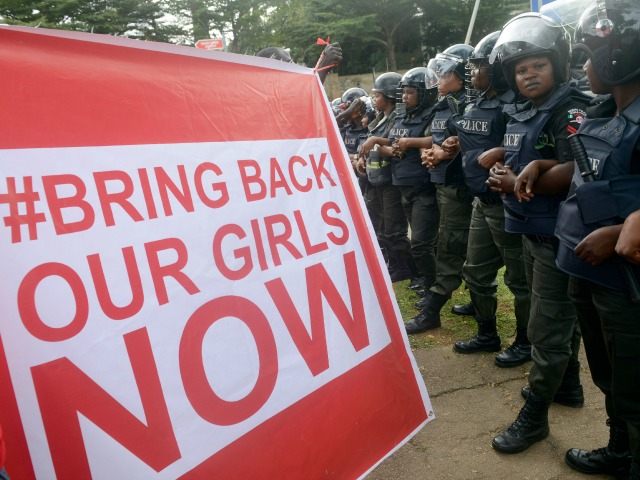The parents of more than 200 girls who remain missing from the Nigerian town of Chibok expressed outrage at the federal government following the announcement that hundreds of female captives had been liberated from Boko Haram terrorists, but none were the famed missing girls of Chibok. “To us, the government no longer has credibility,” said one parent.
The Nigerian government announced on Tuesday that it had staged a major operation against the jihadist group in the dense Sambisa Forest, believed to be Boko Haram’s last major stronghold in Nigeria. Nearly 300 women and girls were rescued from the terrorist group, many injured in gunfire, as some were reportedly used as human shields by terrorists attempting to escape. The government was quick to state that it did not know the identity of these girls and women, but that they were not from Chibok.
“When we heard of the rescue we thought it was our girls. Parents kept contacting one another, hoping to get confirmation that their daughters were the ones rescued,” said Enoch Mark, a parent whose daughter and niece were both kidnapped from Chibok in 2014. He calls the immediate dismissal of the possibility that the recently freed women were from Chibok “disheartening,” though “not surprising.” “This has happened several times. The government has lied a few times. To us, the government no longer has credibility,” he said.
Another parent lamented: “We are an unfortunate bunch caught up in a political game. It is unfortunate that we find ourselves in this situation. They have played with people’s lives and messed people up.”
Parents’s outrage at the military was followed by another announcement Thursday that 160 more hostages have been extracted from the Sambisa Forest, with Nigerian newspaper Vanguard estimating the total number of former Boko Haram captives in federal custody now believed to be “nearly 500.” Army spokesman Sani Usman told the press that, once again, these women were not from Chibok.
Vanguard notes, however, that “defence headquarters” clarified later that authorities actually do not have any idea where these women and girls are from and that “it was too early to say” whether they were from Chibok or not.
The women in the second mass freeing of hostages, the newspaper adds, were not only used as human shields, but “in some cases fired back at soldiers until they were subdued.”
The psychological trauma among the rescued is significant, and posing a challenge to the government in finding out who these women are. Experts note also that, even in the event that their identities are revealed, Boko Haram has destroyed so many towns in northern Nigeria that it is likely these girls have no family or home to return to. “Many of the communities in the northeast are non-existent as we speak,” explains Human Rights Watch researcher Mausi Segun. “So releasing these individuals who either melt into the larger communities or to go into IDP camps where the people already living in those places are living in abysmal conditions, it would be really tragic.”
Nigerian news outlet Naij reported this week that military sources are claiming many of the women found this week are from Gumsuri village, a town on the road that leads to Chibok. Reports from Gumsuri in December estimated that 185 women and children had been taken from the village after Boko Haram razed it to the ground. The village is so remote that authorities heard of the attack four days after it occurred. If confirmed that the girls are from Gumsuri, Segun’s worst case scenario of them adding to the internally displaced population of Nigeria will be likely. It is unknown whether the government will allow them to return to the village or deem it too unsafe.
Before the news of the release of hundreds of captives, Boko Haram had made headlines by changing its name, rebranding to the Islamic State West Africa Province, or ISWAP. The extent of the cooperation between Boko Haram and the Islamic State remains unclear, though both jihadist groups have expressed affinity for each other, and Boko Haram has made an official pledge of allegiance to ISIS.

COMMENTS
Please let us know if you're having issues with commenting.